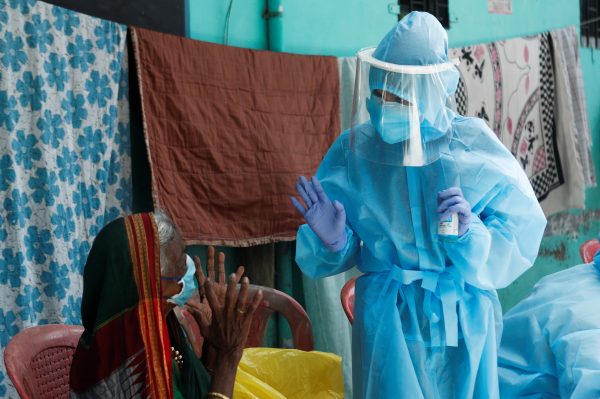The COVID-19 pandemic has further highlighted instances where states struggle to provide adequate healthcare. But despite the episodes in Gorakhpur and Muzaffarpur and a prevailing pandemic, there is no serious discussion about ‘right to healthcare’ legislation.
Provision for healthcare is mandated in Part IV of the Indian Constitution (Directive Principles of State Policy) — but is unenforceable. The Indian Supreme Court in a catena of judgments such as Rakesh Chandra Narayan v. State of Bihar (1988) and Paschim Banga Khet Mazdoorsamity v. State Of West Bengal & Anr (1996) ruled that the right to healthcare is a part of the Fundamental Rights envisaged in the Constitution. This led to making healthcare a partly justiciable right within the narrow contours given in the Supreme Court judgments. Still, the right has not yet been crystallised in legislation. The Indian National Congress party proposed promulgating right to healthcare legislation in 2019, but nothing eventuated.
The need for right to healthcare legislation is an outcome of abysmal healthcare and negligible legal safeguards. But the separation of power between the legislature, executive and judiciary restricts the judiciary to only upholding already existing laws. The judiciary cannot adjudicate on aspects that have not yet been duly legislated by parliament. Any adjudication on non-existent rights would constitute judicial overreach.
Recently, the Indian Supreme Court on 11th June, 2020 took suo-motu cognizance of the deplorable health conditions in the State-run hospitals in the National Capital (Delhi). The Court in two detailed orders dated 12th June and 19thJune, held that the Right to health is a fundamental right envisaged under the Indian constitution. Notably, the Court did play an activist role, however, it was restricted to issue directions only on the basis of promises made by the State made through its affidavits submitted to the Court.
One of the rights-based models that India follows is the conditional rights model. Here, a right is conditional on the existence of a ‘basic social minimum’ available in the form of a policy or legislation created by the parliament or the executive. Legislation will make the right justiciable. This would mean that the legislation would lay down the parameters for adjudicating the right to healthcare.
Citizens could then approach a court of law based on these parameters and have their right to healthcare enforced. This would help guarantee citizens’ rights related to healthcare, create obligations for the state and impose sanctions against wrongdoers — and hopefully result in a more effective standard of healthcare. The legislation would also allow the judiciary to adjudicate on related matters without being accused of judicial overreach.
The argument finds traction from the precedent of the ‘right to education’. Like the right to healthcare, the right to education was a Directive Principle of State Policy found in Part IV of the Indian Constitution. This made it a non-justiciable right. The right was initially recognised through judicial pronouncements where the Supreme Court had read the right to education within the ambit of Article 21 (right to life and liberty), which categorised it as a ‘fundamental right’.
In 2002, the parliament crystallised the right to education as a fundamental right guaranteed under Article 21A of the Constitution. In 2009, it promulgated the Right to Education Act which laid down the rights of the individual and the obligation of state governments in relation to education.
The COVID-19 pandemic — and previous health crises — highlight the need for legislation that enforces the right to healthcare as a justiciable right. The Assam Public Health Act 2010 (Assam Act) already seeks to achieve this at the state level. The Assam Act provides a wide set of rights that the judiciary may adjudicate upon. It also discusses the individual and collective rights of the residents of the state. It guarantees individuals the right to healthcare, autonomy and prior voluntary informed consent, information, their medical records and data, and privacy.
Section 3 of the Act creates two state obligations. The first is the undertaking of adequate budgetary measures to provide for the rational allocation and distribution of resources. The second is ensuring there is access to healthcare for all. It also calls for the creation of a minimum standard of healthcare. This section creates obligations for the state that requires the active participation of the Department of Health and Family Welfare — and other departments — to ensure access to food, safe drinking water, sanitation, and pollution control.
Section 4 of the Act obliges the state to take appropriate legal steps and enact laws in relation to cases of repeated outbreaks or recurrent communicable diseases. This should ensure higher participation by the state in taking preventive measures for disease outbreaks.
Creating legislation that safeguards the right to healthcare is critical. It obliges various government departments to fulfil basic healthcare rights. It will also create a mechanism whereby the judiciary can punish rights violations without violating the separation of power structure.
Shivkrit Rai is a lawyer and law researcher working in the Delhi High Court and Delhi Consumer Courts. He has previously worked as a Senior Research Analyst, with the Centre for New Economic Studies at O.P.Jindal Global University.
This article is part of an EAF special feature series on the novel coronavirus crisis and its impact.

